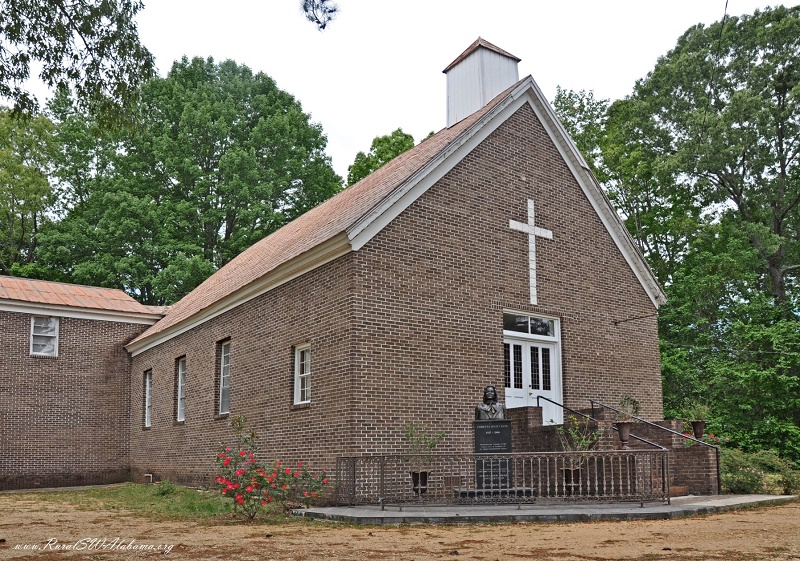When visiting Selma, Alabama, you cannot pass up the opportunity to see American history up close. Taking a day-long tour through history from the beginnings of the Civil War and Civil Rights movement to monuments and museums dedicated to the heroes and history of the town.
Begin with the Old Depot Museum, open Monday-Friday from 10:00 a.m.-4 p.m. and Saturday by appointment. The interpretive history museum tour runs from the Civil War to Civil Rights, from William Rufus King, the vice president who was one of Selma’s founders in 1819 to Martin Luther King, a Nobel Peace Prize winner who led demonstrations in Selma in 1965. Seeing the big picture view of America’s past will give you a background knowledge and understanding of the factors that came together for the Civil Rights events in Selma later in history.
Next, the Ancient Africa, Enslavement and Civil War Museum houses exhibits that depict historical, topical, and provocative impacts and occurrences during slavery in America. Get the big-picture view of the issue but be sure to call ahead and schedule a tour in advance.
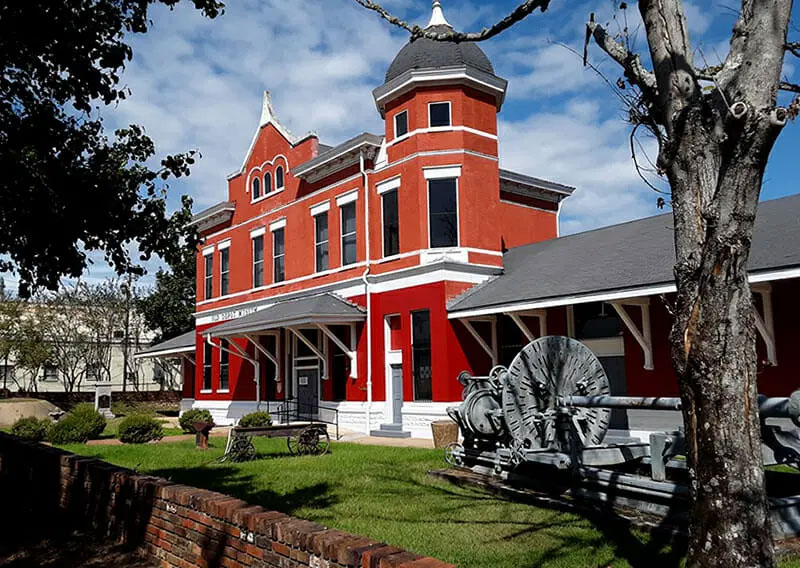
When civil rights activists from the Southern Christian Leadership Conference were trying to find a church to host Selma’s first mass meeting, Reverend Louis L. Anderson offered Tabernacle Baptist Church as the place. This gesture enabled Tabernacle to play a significant role in the struggle for racial equality in Selma. Other churches followed its example and the Movement became a reality in Selma.
One church that followed suit is the Brown Chapel AME Church, which was the headquarters for meetings during the Civil Rights movement. A monument to Martin Luther King, Jr. was dedicated in front of the chapel in 1979. Admission is charged at the church and you will need to call ahead to schedule a tour. Another church is the First Baptist Church of Selma, significant due to it playing a pivotal role in the marches that lead to the passage of the 1965 Voting Act. Dave Benjamin West, a local black architect, constructed the building in 1894 that became considered one of the most architecturally significant late-19th century black churches in the entire state.
Next in the progression of history is the Jackson Home. The Jackson Home became the official residence for social and human rights leaders including Dr. Martin Luther King, Jr., Ambassador Andrew J. Young, Dr. Ralph Nunche, and others in the planning of the Selma to Montgomery March.
For a quick, delicious lunch, stop by Side Porch Sandwiches. Featuring classic Southern cooking and overlooking the Alabama River, the restaurant is right in the middle of historic downtown Selma and one block from the next site.
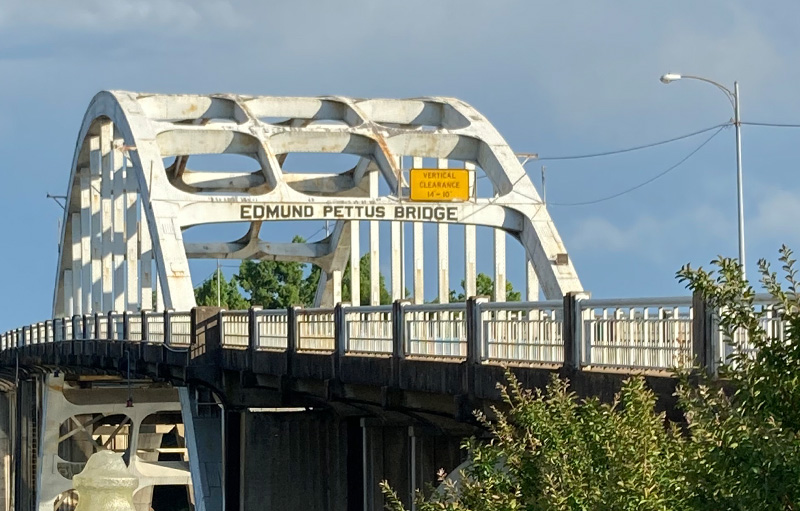
All the planning and meetings in houses and churches led to the events at the Edmund Pettus Bridge. The steel bridge was the site of major conflicts like the Selma to Montgomery Marches and “Bloody Sunday.” USA Weekend includes the bridge, along with Ellis Island, Jamestown and the Lincoln Memorial, among the “ten historic landmarks that bear proud witness to our nation’s enduring freedoms.”
Next, the Ancient Africa, Enslavement and Civil War Museum houses exhibits that depict historical, topical, and provocative impacts and occurrences during slavery in America. Get the big-picture view of the issue but be sure to call ahead and schedule a tour in advance.
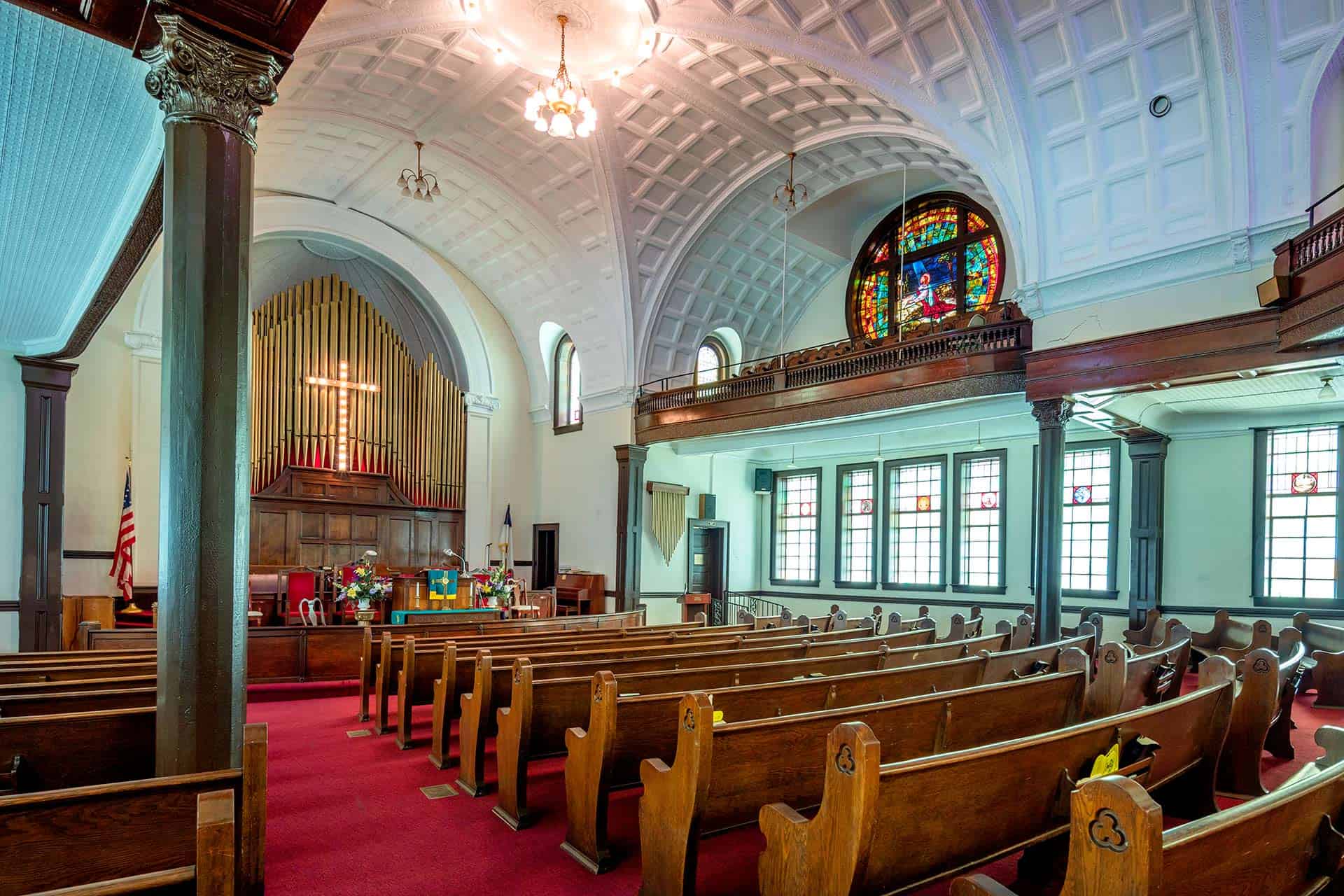
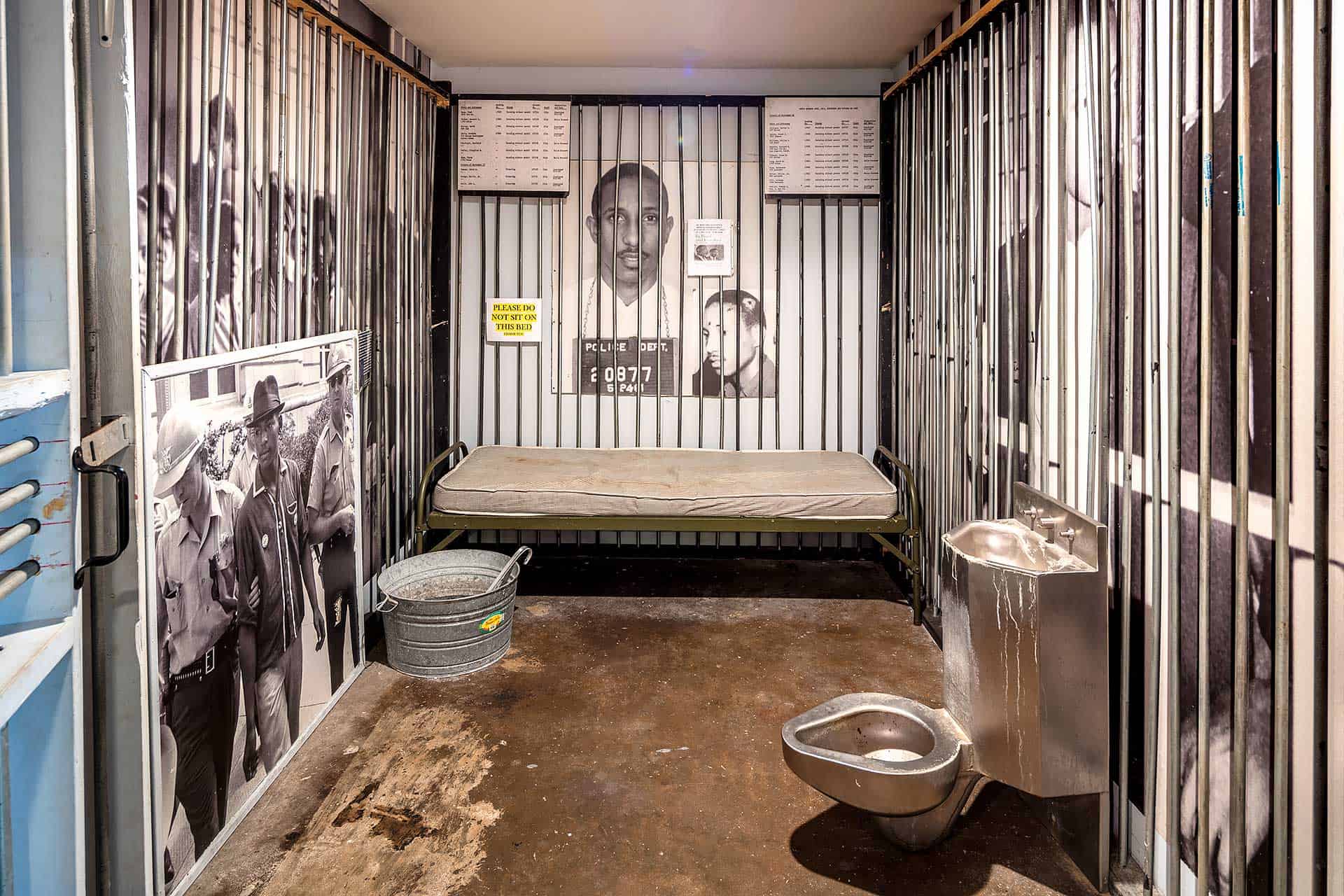
When civil rights activists from the Southern Christian Leadership Conference were trying to find a church to host Selma’s first mass meeting, Reverend Louis L. Anderson offered Tabernacle Baptist Church as the place. This gesture enabled Tabernacle to play a significant role in the struggle for racial equality in Selma. Other churches followed its example and the Movement became a reality in Selma.
One church that followed suit is the Brown Chapel AME Church, which was the headquarters for meetings during the Civil Rights movement. A monument to Martin Luther King, Jr. was dedicated in front of the chapel in 1979. Admission is charged at the church and you will need to call ahead to schedule a tour. Another church is the First Baptist Church of Selma, significant due to it playing a pivotal role in the marches that lead to the passage of the 1965 Voting Act. Dave Benjamin West, a local black architect, constructed the building in 1894 that became considered one of the most architecturally significant late-19th century black churches in the entire state.
Next in the progression of history is the Jackson Home. The Jackson Home became the official residence for social and human rights leaders including Dr. Martin Luther King, Jr., Ambassador Andrew J. Young, Dr. Ralph Nunche, and others in the planning of the Selma to Montgomery March.
For a quick, delicious lunch, stop by Side Porch Sandwiches. Featuring classic Southern cooking and overlooking the Alabama River, the restaurant is right in the middle of historic downtown Selma and one block from the next site.
Once you’ve seen the overall history of Selma, the very buildings in which Civil Rights meetings were held and the bridge where the events went down, visit the National Voting Rights Museum & Institute (NVRMI). This museum exhibits materials and artifacts from those events that fueled the voting rights struggle in America. The NVRMI also provides research forums, community action, and makes presentations that impact or support voting rights issues in America.
Lastly, view monuments dedicated to the leaders of the Voting Rights Movement in Selma Voting Rights Monument and Park. The park includes trails through a wooded area, draped with Spanish moss and leads to breathtaking views of the Selma and Alabama Rivers.
Accommodations for the night and dinner can both be found in the St. James Hotel and Restaurant. The restaurant is in the historic old hotel, which is right by the Alabama River. If you have the chance, ask for a tour of the hotel. The staff can offer an inside glimpse at the history of the hotel.
Old Depot Museum 4 Martin Luther King Street, Selma, AL 36701 (GPS coordinates N32.408750, W87.014056)
Telephone: 334-874-2197
Hours: Monday-Friday, 10:00 a.m. – 4:00 p.m. Saturday: By appointment.
Ancient Africa, Enslavement, & Civil War Museum 1410 Water Avenue, Selma, AL 36701 (GPS CoordinatesN32° 24.483′, W087° 0.9407′)
Telephone: 334-418-0800 www.nvrmi.com
Please call ahead to schedule a tour. Admission Charged.
Tabernacle Baptist Church 1431 Broad Street, Selma, AL 36701 From downtown Selma, travel north on Broad Street. Church will be on your left.
Brown Chapel AME Church 410 Martin Luther King Street, Selma, AL 36703 (GPS coordinates N32.412361, W87.016250)
Telephone: (334) 874-7897
Please call ahead to schedule a tour. Admission charged.
First Baptist Church of Selma 325 Lauderdale Street, Selma, AL 36701
GPS Coordinates: N32.4101, W-87.0229)
Telephone: (334) 877-4400
Jackson Home and Museum 1416 Lapsley Avenue, Selma, AL 36701
(GPS Coordinates: N32.4191, W-87.0311)
Telephone: (404) 792-0666
Website: http://www.jacksonfoundationandmuseum.com/
Side Porch Sandwiches & Pub 1124 Water Ave
Telephone: 334-872-8600
Edmund Pettus Bridge (GPS Coordinates N 32.40646 and W 87.0178)
Located at the intersection of Broad St. and Water Ave. in downtown Selma.
National Voting Rights Museum & Institute 6 Highway 80 East, Selma, AL 36701 (GPS N32° 24.204′, W087° 1.0405′)
Telephone: 334-418-0800 Website: www.nvrmi.com
Hours: Monday – Thursday: 10:00 a.m. to 4:00 p.m. Friday, Saturday, Sunday: By Appointment. Admission Charged
Selma Voting Rights Monument and Park 11 US Hwy 80 N Service Road, Selma, AL 36701 (GPS Coordinates: N32.407359, W-87.021101)
St. James Hotel Restaurant 1200 Water Avenue
Telephone: 334-872-3234
The Lowndes County Interpretive Center houses exhibits on the death of seminarian Jonathan Daniels; the slaying of Viola Liuzzo, and “Tent City,” which housed families dislodged by white landowners. The site
of Tent City is located off US Highway 80 West.
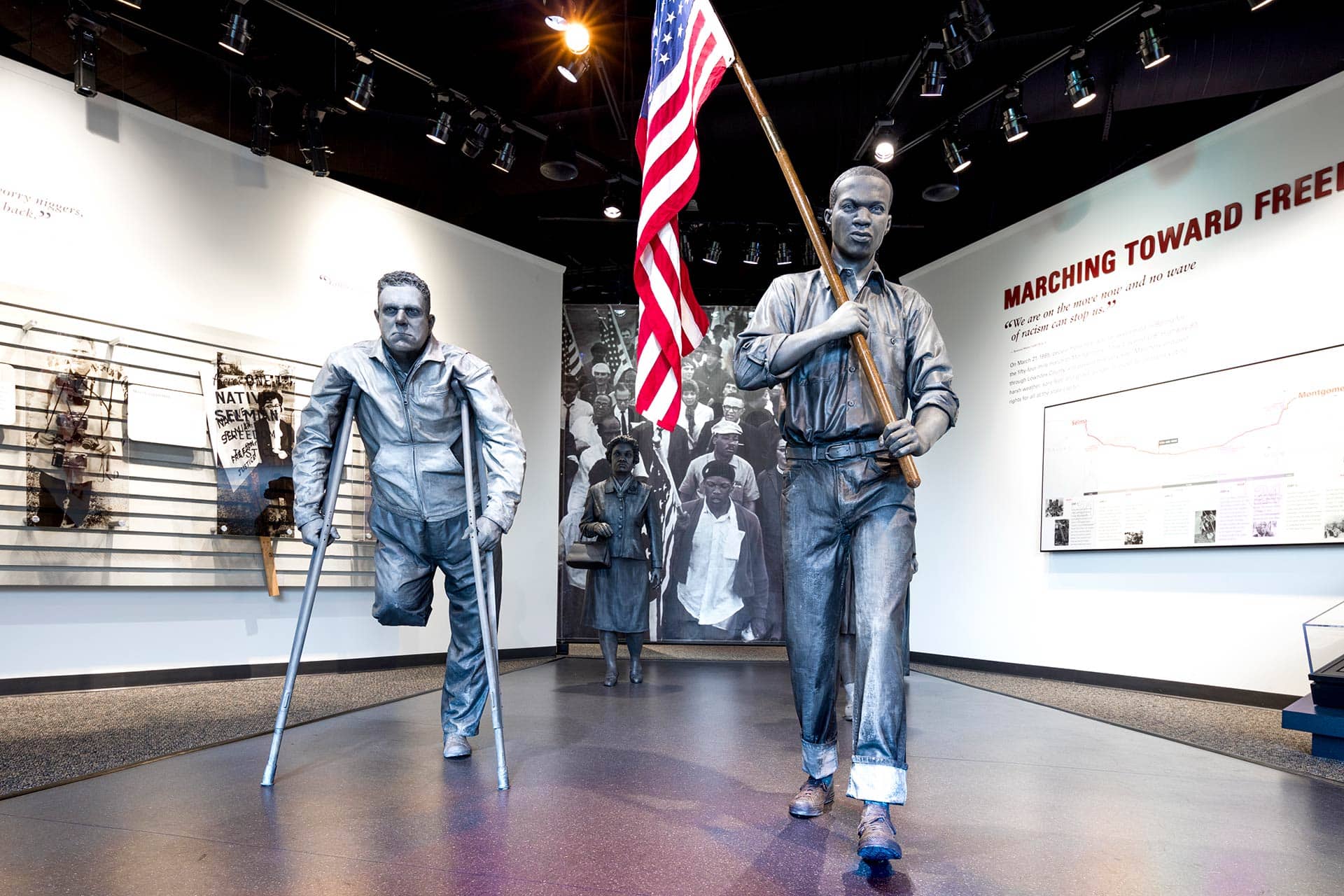
Marion is known as the city that sparked Selma after the murder of Jimmie Lee Jackson. In addition to visiting Jackson’s gravesite, you can follow the Coretta Scott King Memorial Hwy. to see her family’s home and her memorial at the church where she was married to Dr. King.
